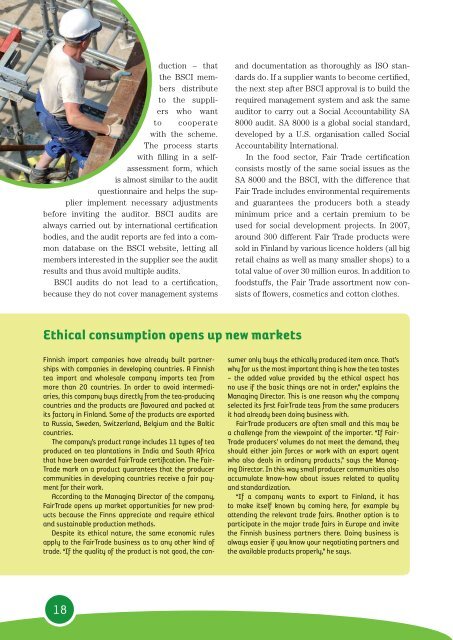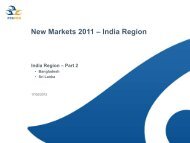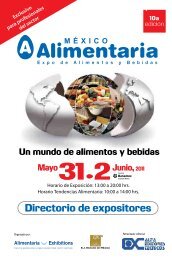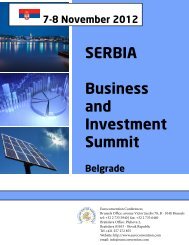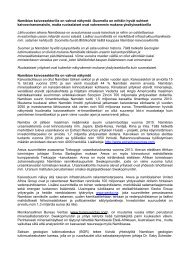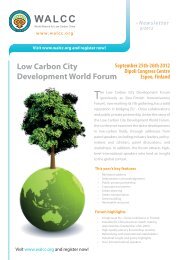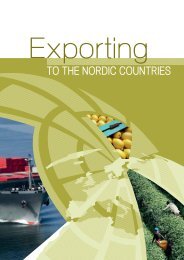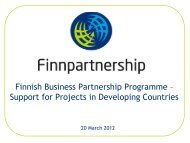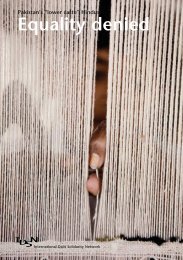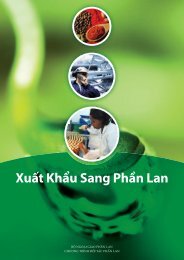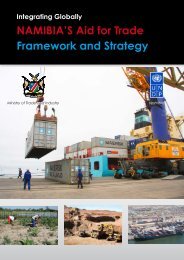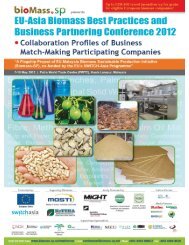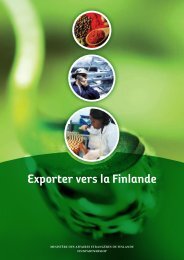Exporting to Finland -guide
Exporting to Finland -guide
Exporting to Finland -guide
You also want an ePaper? Increase the reach of your titles
YUMPU automatically turns print PDFs into web optimized ePapers that Google loves.
duction – that<br />
the BSCI members<br />
distribute<br />
<strong>to</strong> the suppliers<br />
who want<br />
<strong>to</strong> cooperate<br />
with the scheme.<br />
The process starts<br />
with filling in a selfassessment<br />
form, which<br />
is almost similar <strong>to</strong> the audit<br />
questionnaire and helps the supplier<br />
implement necessary adjustments<br />
before inviting the audi<strong>to</strong>r. BSCI audits are<br />
always carried out by international certification<br />
bodies, and the audit reports are fed in<strong>to</strong> a common<br />
database on the BSCI website, letting all<br />
members interested in the supplier see the audit<br />
results and thus avoid multiple audits.<br />
BSCI audits do not lead <strong>to</strong> a certification,<br />
because they do not cover management systems<br />
and documentation as thoroughly as ISO standards<br />
do. If a supplier wants <strong>to</strong> become certified,<br />
the next step after BSCI approval is <strong>to</strong> build the<br />
required management system and ask the same<br />
audi<strong>to</strong>r <strong>to</strong> carry out a Social Accountability SA<br />
8000 audit. SA 8000 is a global social standard,<br />
developed by a U.S. organisation called Social<br />
Accountability International.<br />
In the food sec<strong>to</strong>r, Fair Trade certification<br />
consists mostly of the same social issues as the<br />
SA 8000 and the BSCI, with the difference that<br />
Fair Trade includes environmental requirements<br />
and guarantees the producers both a steady<br />
minimum price and a certain premium <strong>to</strong> be<br />
used for social development projects. In 2007,<br />
around 300 different Fair Trade products were<br />
sold in <strong>Finland</strong> by various licence holders (all big<br />
retail chains as well as many smaller shops) <strong>to</strong> a<br />
<strong>to</strong>tal value of over 30 million euros. In addition <strong>to</strong><br />
foodstuffs, the Fair Trade assortment now consists<br />
of flowers, cosmetics and cot<strong>to</strong>n clothes.<br />
Ethical consumption opens up new markets<br />
Finnish import companies have already built partnerships<br />
with companies in developing countries. A Finnish<br />
tea import and wholesale company imports tea from<br />
more than 20 countries. In order <strong>to</strong> avoid intermediaries,<br />
this company buys directly from the tea-producing<br />
countries and the products are flavoured and packed at<br />
its fac<strong>to</strong>ry in <strong>Finland</strong>. Some of the products are exported<br />
<strong>to</strong> Russia, Sweden, Switzerland, Belgium and the Baltic<br />
countries.<br />
The company’s product range includes 11 types of tea<br />
produced on tea plantations in India and South Africa<br />
that have been awarded FairTrade certification. The Fair-<br />
Trade mark on a product guarantees that the producer<br />
communities in developing countries receive a fair payment<br />
for their work.<br />
According <strong>to</strong> the Managing Direc<strong>to</strong>r of the company,<br />
FairTrade opens up market opportunities for new products<br />
because the Finns appreciate and require ethical<br />
and sustainable production methods.<br />
Despite its ethical nature, the same economic rules<br />
apply <strong>to</strong> the FairTrade business as <strong>to</strong> any other kind of<br />
trade. “If the quality of the product is not good, the consumer<br />
only buys the ethically produced item once. That’s<br />
why for us the most important thing is how the tea tastes<br />
– the added value provided by the ethical aspect has<br />
no use if the basic things are not in order,” explains the<br />
Managing Direc<strong>to</strong>r. This is one reason why the company<br />
selected its first FairTrade teas from the same producers<br />
it had already been doing business with.<br />
FairTrade producers are often small and this may be<br />
a challenge from the viewpoint of the importer. “If Fair-<br />
Trade producers’ volumes do not meet the demand, they<br />
should either join forces or work with an export agent<br />
who also deals in ordinary products,” says the Managing<br />
Direc<strong>to</strong>r. In this way small producer communities also<br />
accumulate know-how about issues related <strong>to</strong> quality<br />
and standardization.<br />
“If a company wants <strong>to</strong> export <strong>to</strong> <strong>Finland</strong>, it has<br />
<strong>to</strong> make itself known by coming here, for example by<br />
attending the relevant trade fairs. Another option is <strong>to</strong><br />
participate in the major trade fairs in Europe and invite<br />
the Finnish business partners there. Doing business is<br />
always easier if you know your negotiating partners and<br />
the available products properly,” he says.<br />
18


